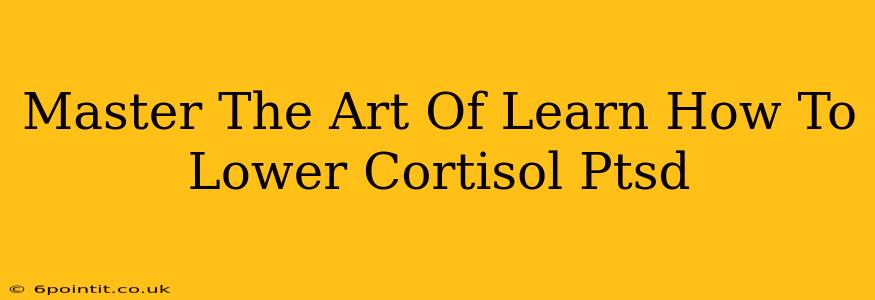Post-traumatic stress disorder (PTSD) significantly impacts millions, disrupting daily life and overall well-being. A key player in this struggle is cortisol, the stress hormone. Elevated cortisol levels are frequently associated with PTSD symptoms, creating a vicious cycle of anxiety, hypervigilance, and emotional distress. This comprehensive guide will explore effective strategies to help you master the art of lowering cortisol and finding relief from PTSD.
Understanding the Cortisol-PTSD Connection
Before diving into solutions, it's crucial to understand the relationship between cortisol and PTSD. Trauma triggers a surge in cortisol, preparing the body for "fight or flight." However, in PTSD, this response remains chronically activated, even in the absence of immediate danger. This constant elevation leads to:
- Sleep disturbances: Insomnia, nightmares, and difficulty staying asleep are common due to elevated cortisol interfering with sleep cycles.
- Anxiety and panic attacks: High cortisol levels heighten anxiety and increase the likelihood of experiencing panic attacks.
- Mood swings and irritability: The prolonged stress response can cause dramatic mood swings and increased irritability.
- Cognitive impairment: Difficulty concentrating, memory problems, and brain fog are often associated with chronically high cortisol.
- Physical symptoms: Headaches, muscle tension, digestive issues, and a weakened immune system are all potential consequences.
Proven Strategies to Lower Cortisol for PTSD
Lowering cortisol isn't about eliminating stress entirely – that's unrealistic. Instead, it's about managing the stress response and promoting a sense of calm and control. Here are some evidence-based strategies:
1. Lifestyle Modifications: The Foundation for Cortisol Control
- Prioritize Sleep: Aim for 7-9 hours of quality sleep each night. Establish a regular sleep schedule, create a relaxing bedtime routine, and optimize your sleep environment for darkness and quiet. This is crucial for cortisol regulation.
- Nourish Your Body: A balanced diet rich in fruits, vegetables, whole grains, and lean protein provides the nutrients needed to support healthy cortisol levels. Avoid processed foods, excessive sugar, and caffeine, all of which can exacerbate stress.
- Regular Exercise: Physical activity is a powerful tool for stress reduction. Engage in activities you enjoy, whether it's yoga, walking, swimming, or strength training. Aim for at least 30 minutes of moderate-intensity exercise most days of the week.
- Mindfulness and Meditation: Practicing mindfulness and meditation can help you become more aware of your thoughts and feelings, allowing you to manage stress responses more effectively. Even short meditation sessions can make a difference.
2. Therapeutic Interventions: Addressing the Root of the Problem
- Therapy: Cognitive Processing Therapy (CPT) and Prolonged Exposure Therapy (PE) are effective therapies specifically designed to treat PTSD. These therapies help you process traumatic memories and reduce their impact on your daily life.
- EMDR Therapy: Eye Movement Desensitization and Reprocessing (EMDR) is another effective therapy that helps process traumatic memories by using bilateral stimulation, such as eye movements.
3. Complementary Practices: Enhancing Your Well-being
- Yoga and Tai Chi: These practices combine physical postures, breathing techniques, and mindfulness to promote relaxation and reduce stress.
- Deep Breathing Exercises: Simple deep breathing exercises can quickly calm your nervous system and lower cortisol levels.
- Spending Time in Nature: Studies show that spending time outdoors can reduce stress and improve mood.
Important Note: Seeking Professional Help
It's crucial to remember that managing PTSD and lowering cortisol levels requires a holistic approach. While the strategies mentioned above can be incredibly helpful, they shouldn't replace professional help. If you're struggling with PTSD, seek help from a qualified mental health professional. They can provide personalized guidance, tailored treatment plans, and support throughout your journey to recovery. Don't hesitate to reach out – your well-being is paramount.
By combining lifestyle modifications, therapeutic interventions, and complementary practices, you can effectively manage your cortisol levels and find relief from the debilitating effects of PTSD. Remember, recovery is a process, and progress takes time and dedication. Be patient with yourself, celebrate your successes, and continue to seek support along the way.

